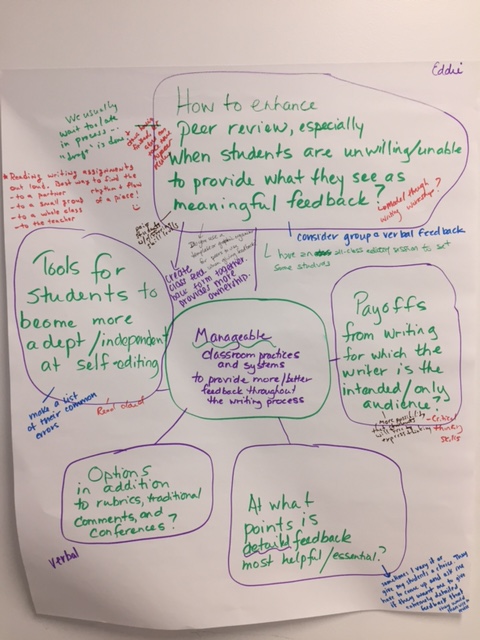We began the marathon at Krannert Art Museum, where I found a seat in a gallery dedicated to art created as part of the WPA.
I grew up looking at paintings that were a product of the WPA. My stepfather’s youngest aunt, Grace, was a skilled artist who studied, as I remember, in Paris during the 1920s. In the thirties, she landed a WPA job that sent her to the Southwest where she painted a series documenting the way of life of the Pueblo Indians. Some of these oils, unframed and filled with the hazy colors of sand and sky, hung in the dining rooms of two houses I lived in between the ages of eleven and nineteen.
I never knew Aunt Grace, but when I began college, I spent a few weeks living at the family homestead with my step-grandparents, Harold and Lois, Grace’s older brother and his wife. (How that came to pass is another story.) During that time, I was given the suite of rooms Grace had occupied as a young woman.
There was a heavy lock on the outside of the door leading to these rooms–obviously intended, I thought, to keep someone in. When I inquired about it, Harold thought a very long time before replying.
Finally, he said, “You know, Grace was an incredible artist from the time she was a little girl. We’d never seen anyone in this town who could paint and draw like that.
“When she was seventeen, she was accepted as a student at the Art Institute in Chicago. They gave her a full scholarship, and a good thing, too. We all knew how talented she was–that she needed to go–but there was no way on God’s green earth the family could have paid her way.
“Then, a year or so later, she was offered a chance to study in Paris. When she said there was another scholarship, we didn’t look into it too deep. Why would we? Her dreams–our dreams for her–were coming true. We bought her a steamer trunk, helped her pack, and off she went.
“That was in August. She wrote weekly all through the fall and into the early winter. Her letters were cheerful, newsy, filled with accounts of the people she met, the sights she saw, the projects she was working on.
“Then, in February, the letters just . . .stopped.
“Not too much later, one of Grace’s professors from the Art Institute paid us a visit. He had received a letter from someone he knew on the Paris faculty. Grace wasn’t herself, the letter said. She wasn’t well. There had been some trouble. She wasn’t fit to travel by herself; someone needed to come to Paris and bring her home.
“The whole time the professor was talking to us, there was a strange vagueness to what he said and he wouldn’t meet our eyes. The seriousness of the situation came through loud and clear, but the details were skimpy. When we pressed him, he said he didn’t know anything more. I think he did, though, he just couldn’t bring himself to say.
“When I asked him about her scholarship, whether they’d have her back when she was better, he finally did make eye contact. ‘Scholarship?’ he asked, expression completely baffled. “Grace said her family was footing the bill.”
At that point, Grandpa Harold stopped talking. He was looking inward, remembering, I think, and also, I’m now sure, sorting through the details of what he’d already told me and deciding what more he wanted to say. What ought he to say to a step-granddaughter he really didn’t know very well? How many family secrets do you reveal, after all, to someone who isn’t really family?
He started up again after a minute, but there was a distance to his tone that hadn’t been there before. “Anyhow,” he said, “we managed to scrape together the money. Dad went and got her and brought her home. And home she stayed for the next two years.”
And that was that. He was finished. But I wasn’t.
“But what about the lock?”
“Oh, that.” He sighed. “Grace had spells,” he said, “when she was a danger to herself, and to other people too, maybe. We had to lock her in.”
I tried a couple of times to get him to tell me more, but after a while I realized he’d said all he had to say on the subject, at least to me. It was as though, for a brief few moments, he’d forgotten everything except Grace, what had happened to her all those years ago, how it had felt to be her brother. But mostly he’d forgotten who he was talking to. Mere curiosity doesn’t entitle you to anything, and he was telling me things I didn’t have the right to know.

